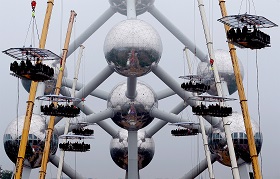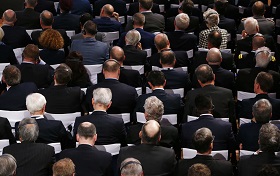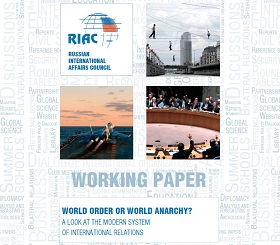Thirty years ago, in the summer of 1989, the National Interest published the famous article “The End of History” that made the young American political scientist and philosopher Francis Fukuyama famous. Three years later, the article was expanded into a voluminous book that became a bestseller in the United States and was translated into dozens of foreign languages.
In Russia, or at least among Russian intellectuals, The End of History quickly became a symbol of the era, much like the crimson jackets of the first “New Russians,” liter bottles of the Dutch distilled spirit Royal and the electrifying Macarena. Fukuyama was cited, Fukuyama was quoted, but most often, Fukuyama was criticized. For the haughtiness of his liberalism. For his superficial and unprofessional view of history. For his free interpretations of Hegel. For being an apologist of the “unipolar world.” Hardly any other contemporary western scholar was such a popular punching bag for Russian social scientists. Echoes of this criticism are heard even today, 30 years later, although, over these decades, Fukuyama’s work has somewhat receded into the background, ceding its place to new equally stark and equally provocative works by other authors.
When university academics attack Fukuyama, they do not always take into account the obvious point that every literary genre has its laws and specific features. The End of History of 1989 should be seen not as a fundamental academic work, but as an intellectual provocation, a political manifesto of sorts. The Manifesto of the Communist Party by Karl Marx and Friedrich Engels should not be approached with the same yardstick as Marx’s Capital. When, 30 years later, we look back at Fukuyama article in the National Interest, it appears romantic, combative and naïve, but does Mikhail Gorbachev’s “new thinking” rhetoric of the same time look any less romantic and naïve? And which one of us was not a naïve romantic in 1989?
Fukuyama’s grand meanings have been refuted, trampled into dust and ridiculed many times over. Yet, what have the critics put forth as an alternative concept of a stable and efficient world order? An ambiguous and poorly detailed concept of an archaic “multipolar world”? Apocalyptic pictures of an impending free-for-all, chaos, wars, and conflicts? Predicting future misfortunes and upheavals does not take great insight; minimal imagination suffices. However, finding a way of restoring global governance that is more realistic than the “end of history” requires grand-scale thinking and intellectual audacity that are at least comparable to the scale and daring of the young Fukuyama.
Fukuyama turns to Nietzsche to outline one of the most fundamental problems of the “post-historical world.” He thinks that the coming of the “last man” may become a side effect of the “end of history,” and it will bring human civilization to decline and ruin. At the same time, however, Fukuyama makes multiple qualifications and reservations to the effect that the “post-historical society” can put various obstacles in the path of the “last man.”
But there is a paradox here. History has not ended, “post-historical” society has not triumphed in any country, but “the last man” has already appeared on our common horizon. He does not give a damn about whether history has ended or not: history has nothing whatsoever to do with him. He saunters along, as the “last man” should, without being in a hurry. He has nowhere to hurry, and no reason to: he has eternity in front of him. Yet, the slow, shuffling steps of the “last man” are heard ever more clearly in the West and in the East, in the North and in the South. He saunters around the planet as if he is its master, and as he walks, he surveys his new piece of real estate.
Friends, we need to do something with this insolent claimant of our rightful abode!
Thirty years ago, in the summer of 1989, the National Interest published the famous article “The End of History” that made the young American political scientist and philosopher Francis Fukuyama famous. Three years later, the article was expanded into a voluminous book that became a bestseller in the United States and was translated into dozens of foreign languages.
In Russia, or at least among Russian intellectuals, The End of History quickly became a symbol of the era, much like the crimson jackets of the first “New Russians,” liter bottles of the Dutch distilled spirit Royal and the electrifying Macarena. Fukuyama was cited, Fukuyama was quoted, but most often, Fukuyama was criticized. For the haughtiness of his liberalism. For his superficial and unprofessional view of history. For his free interpretations of Hegel. For being an apologist of the “unipolar world.” Hardly any other contemporary western scholar was such a popular punching bag for Russian social scientists. Echoes of this criticism are heard even today, 30 years later, although, over these decades, Fukuyama’s work has somewhat receded into the background, ceding its place to new equally stark and equally provocative works by other authors.
I have always found it hard to share the spirit of the many critics of The End of History, if only for the simple reason that I met the scholar long before he became the great Francis Fukuyama. Back then, he was Frank, a young RAND staffer studying the Soviet strategy in the “third world.” At the start of perestroika, I had the opportunity to be the leader, on the Soviet side, of a bilateral cooperation project involving young Soviet and American scholars, and Fukuyama was a collaborator on that project. He did not appear to me at that time to be either the most charismatic, or the most eloquent member of the American team. However, he also was not a stubborn dogmatist or a fanatical ideologue. In general, Frank preferred to listen, rather than to speak. It was difficult to reproach him for either intellectual arrogance or pointed disregard for other people’s opinions.
Of course, his sudden fame and his headlong breakthrough into the inner circle of the American intellectual elite could not but leave their mark on Fukuyama. Meeting him in Washington from time to time during the 1990s, I was saddened to see him becoming increasingly self-important. Sometimes, he sounded patronizing and bossy. Nonetheless, he was still interested in new ideas, always ready for a dialogue, capable of evolving and changing his views, of acknowledging his mistakes and errors: Fukuyama carried these features of his young self through the 1990s and into his older age.
When university academics attack Fukuyama, they do not always take into account the obvious point that every literary genre has its laws and specific features. The End of History of 1989 should be seen not as a fundamental academic work, but as an intellectual provocation, a political manifesto of sorts. The Manifesto of the Communist Party by Karl Marx and Friedrich Engels should not be approached with the same yardstick as Marx’s Capital. When, 30 years later, we look back at Fukuyama article in the National Interest, it appears romantic, combative and naïve, but does Mikhail Gorbachev’s “new thinking” rhetoric of the same time look any less romantic and naïve? And which one of us was not a naïve romantic in 1989?
Viewing western-type liberal democracy as the final stage of humanity’s development and as the universally optimal socio-political form, Fukuyama arrives at the conclusion that for states with a “stable democracy,” history in its traditional interpretation – with its conflicts and wars, harsh rivalries and nationalism – had already ended by the last decade of the 20th century. And, together with history, traditional politics, philosophy, religion, and even the arts should also become things of the past. For instance, traditional domestic and foreign policies are increasingly replaced with politically neutral mechanisms for balancing the multidirectional interests of various social groups or states. Fukuyama sees fine-tuning state institutions and finding a balance of interests in “post-historical societies” as technical or even mathematical problems; in that respect, he is closer to Descartes’s rationalism than to Hegel’s dialectics.
For Fukuyama, the world where history continues is limited to the global periphery, to those countries and regions that still have to complete the process of their modernization. The periphery is still plunged into armed conflicts; this the place of bloody revolutions, clashes of irreconcilable ideologies and international coalitions that form and collapse. The “post-historical world” will for a long time run on a parallel course with the “historical world,” but since the former is much stronger, more efficient and more attractive than the latter, the global “core of liberalism” will inevitably continue to draw parts of the “traditionalist” periphery into it, thus bringing the end of history on global scale closer.
Let us not forget that “The End of History” was written when the global socialist system was collapsing before our eyes, when the global “East-West” split seemed to be disappearing into oblivion forever, when the “third wave of democratization” had peaked, when those tectonic social and economic shifts that would later be called “globalization” were being felt everywhere. Bards of the liberal triumph abounded in those times of trouble, but it was Francis Fukuyama who succeeded in giving this triumph a truly epic scale. His eschatological utopia directly challenged the Christian eschatology (the end of history as the Second Coming of Christ and the Kingdom of God on Earth) and the Communist eschatology (the end of history as the result of building a classless society and the atrophy of the state).
Apparently, it was the large scale of Fukuyama’s concept and the ultimate rigidity of his logical construct that made his views so popular with the Clinton administration, and with the George W. Bush administration in particular. As always, practice far outstripped theory, taking Fukuyama’s ideas to their logical conclusion. While Fukuyama wrote about global democratization, for politicians in Washington at the turn of the century, democratization was reduced to global Americanization, and the ideal world order consisted not in searching for mathematically calibrated balance of interests of “stable democracies,” but in perpetuating the notorious “unipolar moment” that emerged in the world following the self-destruction of the Soviet Union.
Admittedly, Fukuyama himself paid tribute to the political situation of the day. Even though he wrote about the necessarily long parallel co-existence of the “post-historical” and “historical” worlds, it did not preclude him from long supporting the interference of the United States in the affairs of the global periphery and, in particular, from calling for the overthrow of Saddam Hussein’s regime in Iraq. However, it was the U.S. intervention in Iraq that caused Fukuyama to undertake a very serious revision of his political stance. By 2004, he had cut his ties with his old friends in the George W. Bush administration and even decided to stop cooperating with the conservative National Interest journal that had opened the door to global fame and intellectual influence for him.
As often happens with bestselling authors, the works of the “mature” Fukuyama were less popular than The End of History. They are not marked by his erstwhile radicalism and firm conviction of his own self-righteousness. The “mature” Fukuyama is more restrained in his assessments and more cautious in his conclusions than the “young” Fukuyama. And still, he makes worthwhile reading, at least in order to trace the tell-tale evolution of one of the most notable and consistent proponents of the political philosophy of liberalism.
For instance, while Fukuyama previously viewed the state as a hindrance to socioeconomic development than a means towards it, now he stresses the importance of strong and effective governmental institutions. While previously he defined the interaction between “post-historical” and “historical” worlds solely as a process of the former gradually subsuming the latter, now he insists on the need to analyze the internal development factors of “traditionalist” societies. While previously the outcome of the global confrontation between western democracy and eastern authoritarianism appeared obvious to him, today, given the growing rivalry between the United States and China, Fukuyama leaves the question of the model for the future human civilization open.
Let us, however, go back to The End of History. Re-reading various reviews of Francis Fukuyama’s first works (let us note in parentheses that, apparently, not all critics took the trouble of reading the source material), one involuntarily arrives at the conclusion that, in their desire to refute, score points against, or even pointedly “unmask” the famous American scholar, Fukuyama’s many opponents overlook the fundamental questions that you simply cannot help asking upon reading Fukuyama’s works. There were no convincing answers to those questions 30 years ago, nor are there any today.
Of course, like all utopian thinkers before him, Fukuyama makes a mistake when he talks about the impending “end of history.” History did not end in 1989, nor has it ended in 2019. It will continue for as long as humanity continues to exist with all its emotions, biases, ambitions, and bouts of madness. But what form will history take? Will we see it moving in circles, endlessly repeating the same cycles? And will the periods of antiquity, traditionalism, modernity, and post-modernity follow each like the seasons of the year? Or will history develop in a spiral? Are the many economic, sociocultural, and political shifts Fukuyama noted 30 years ago irreversible? And if history is a spiral and not a circle, what is the radical difference between the turns of that spiral that follow each other?
Fukuyama does, indeed, appear to have overestimated the expansionist potential of global liberal political systems. Yet, as far as one can see, in the 30 years that have passed since liberalism triumphed globally over communism, no comprehensive alternative to political liberalism that would be comparable to communism has appeared. The rising Islamic fundamentalism or the burgeoning national particularism can hardly be considered such alternatives. China is apparently not ready to propose an export-oriented model of its political authoritarianism. While Russia is drifting farther and farther away from the West politically, it continues to declare its adherence to the basic values of western democracy and market economy. How many decades more do we need to wait to see a full-fledged alternative to liberalism? Or was Fukuyama correct and such alternative cannot be invented as a matter of principle, just like we cannot invent the perpetual motion machine?
Indeed, Fukuyama's notion of the world’s black-and-white split into “historical” and “post-historical” appears naïve and unconvincing today. The dividing line between “history” and “post-history” does not run between states, it runs between individual social, political, religious, and other groups within each country. Put very simply, it is the division between those who somehow benefit from globalization and those who become its victims. Hence the deep split in the US society today. Hence the unprecedented polarization of political life in Europe. Hence the drama of Brexit. This is the source of many political problems that Russia faces today and that China will face, too, sooner or later. Yet, the fact that dividing lines do not run where Fukuyama saw them and the way he saw them does not remove the problem of the split itself. Moreover, it is the close intertwining, interpenetration, and inseparability of the “historical” and “post-historical” worlds that makes the task of searching for the algorithms of their co-existence far more difficult. Fukuyama gave just a very general outline of this task.
Indeed, Fukuyama was a romantic and an idealist: he believed in the liberal idea, in the “grand meanings” of history, in the possibility of ordering international relations on a rational basis. This conviction was the source of the optimism that is evident in his early works. Today, little is left of his faith in the almighty political liberalism and in the ultimate triumph of liberalism. Fukuyama’s grand meanings have been refuted, trampled into dust and ridiculed many times over. Yet, what have the critics put forth as an alternative concept of a stable and efficient world order? An ambiguous and poorly detailed concept of an archaic “multipolar world”? Apocalyptic pictures of an impending free-for-all, chaos, wars, and conflicts? Predicting future misfortunes and upheavals does not take great insight; minimal imagination suffices. However, finding a way of restoring global governance that is more realistic than the “end of history” requires grand-scale thinking and intellectual audacity that are at least comparable to the scale and daring of the young Fukuyama.
Incidentally, the full title of Francis Fukuyama’s book published in 1992 is The End of History and the Last Man. If the “end of history” can be interpreted as a direct reference to Hegel, then “the last man” is a term that Fukuyama clearly borrowed from Nietzsche. In his programmatic Thus Spoke Zarathustra, Nietzsche depicts the antipode of his Übermensch as a being that has completely lost the will to power and willingness to take risks, a being that seeks only creature comforts, momentary pleasures, and security. Through Zarathustra, Nietzsche predicts a time when the society of “last men” will lose the differences between rulers and subjects, the strong and the weak, the outstanding and the mediocre. This is a society that has no flight or plight of spirit; it has no criminals, but it also has no heroes. The social fabric is growing progressively thinner, and society is rapidly fragmenting into individual human atoms. Conflicts are becoming a thing of the past, but creativity fades, too. Supra-personal goals fall into myths and legends, personal goals become the only important thing. The place of the human-creator is taken by the human-consumer.
Fukuyama turns to Nietzsche to outline one of the most fundamental problems of the “post-historical world.” He thinks that the coming of the “last man” may become a side effect of the “end of history,” and it will bring human civilization to decline and ruin. At the same time, however, Fukuyama makes multiple qualifications and reservations to the effect that the “post-historical society” can put various obstacles in the path of the “last man.”
But there is a paradox here. History has not ended, “post-historical” society has not triumphed in any country, but “the last man” has already appeared on our common horizon. He does not give a damn about whether history has ended or not: history has nothing whatsoever to do with him. He saunters along, as the “last man” should, without being in a hurry. He has nowhere to hurry, and no reason to: he has eternity in front of him. Yet, the slow, shuffling steps of the “last man” are heard ever more clearly in the West and in the East, in the North and in the South. He saunters around the planet as if he is its master, and as he walks, he surveys his new piece of real estate.
Friends, we need to do something with this insolent claimant of our rightful abode!








